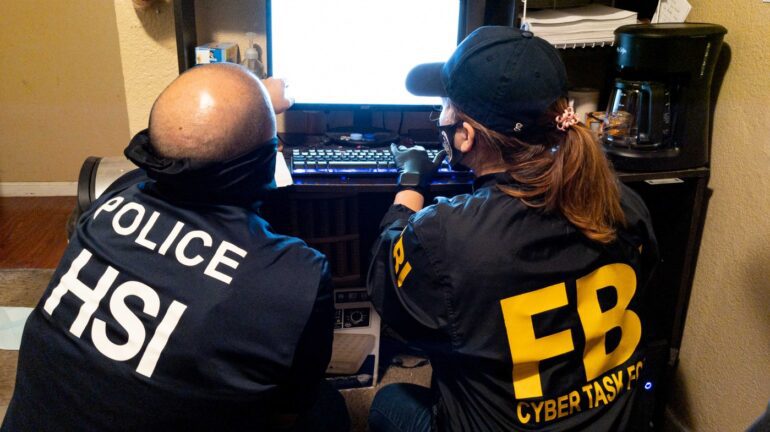TL;DR:
- FBI warns of criminals exploiting deepfakes for extortion, targeting victims across various age groups.
- Deepfakes are AI-generated manipulated media that can convincingly depict false events.
- Law enforcement agencies received over 7,000 reports of online extortion targeting minors, with a rise in “sextortion scams” using deepfakes.
- Not all deepfakes are malicious; some have gone viral for entertainment purposes.
- FBI advises against paying ransoms as it doesn’t guarantee prevention of deepfake dissemination.
- Recommendations include cautious online behavior, using privacy features, and monitoring children’s activities.
- The U.S. Federal Trade Commission also warns about deepfakes used to deceive victims into sending money.
- Vigilance and proactive measures are crucial to mitigate risks associated with AI-driven threats.
Main AI News:
In a world where generative AI can create stunningly realistic images, the U.S. Federal Bureau of Investigation (FBI) is sounding the alarm on a new wave of criminal activity. Deepfakes, manipulated media using artificial intelligence, are being employed by malicious actors to extort unsuspecting victims.
According to the FBI, reports continue to pour in from victims of all ages, including minors and non-consenting adults, whose photos or videos have been altered and transformed into explicit content. In a public service announcement (PSA) alert issued on Monday, the agency emphasized the severity of the situation.
Last year alone, law enforcement agencies received over 7,000 reports of online extortion targeting minors. Disturbingly, since April, there has been a surge in victims falling prey to what has been dubbed “sextortion scams,” where deepfakes play a central role in the perpetrators’ schemes.
Deepfakes, a product of artificial intelligence advancements, refer to increasingly sophisticated video or audio content that convincingly depicts false events. The development of generative AI platforms like Midjourney 5.1 and OpenAI’s DALL-E 2 has only made it more difficult to discern these fabricated narratives from reality.
One prominent example occurred in May when a deepfake video featuring Tesla and Twitter CEO Elon Musk went viral. Crafted with the intention to defraud cryptocurrency investors, the video seamlessly blended manipulated footage from previous interviews, tailored to fit the fraudulent scheme.
However, not all deepfakes are malicious in nature. Earlier this year, a deepfake video of Pope Francis sporting a white Balenciaga jacket gained significant attention. Similarly, AI-generated deepfakes have been employed to bring deceased individuals back to life, offering a glimpse into the potential positive applications of this technology.
Nevertheless, the FBI strongly advises against succumbing to extortion demands, as paying the ransom does not guarantee that the perpetrators will refrain from disseminating the deepfake content. Instead, they recommend exercising caution when sharing personal information and content online. This includes employing privacy features, such as setting accounts to private, and actively monitoring children’s online activities.
Additionally, individuals are urged to remain vigilant for any suspicious behavior from acquaintances or individuals they have interacted with in the past. To safeguard against potential threats, the FBI encourages regular searches for personal and family member information online.
The U.S. Federal Trade Commission (FTC) has joined the FBI in raising awareness about the dangers posed by deepfakes. The FTC highlighted cases where criminals had exploited this technology to deceive unsuspecting victims into sending money by creating audio deepfakes that impersonate their friends or family members, claiming they have been kidnapped.
Emphasizing the present reality of artificial intelligence, the FTC stated, “AI is no longer a far-fetched idea out of a sci-fi movie. We’re living with it, here and now. A scammer could use AI to clone the voice of your loved one.” The agency warned that even a short audio clip of a family member’s voice is enough for these criminals to fabricate convincing recordings.
Conclusion:
The FBI’s warning about deepfake extortion scams highlights the growing threat posed by malicious actors exploiting AI technology. The surge in reported cases, particularly those involving minors, calls for heightened vigilance in the digital space. This trend has significant implications for the market, with businesses needing to address the risks associated with deepfakes to protect their reputation and ensure the safety of their customers.
Additionally, the widespread use of deepfakes for entertainment purposes underscores the need for advanced detection and authentication technologies to combat the potential misuse of this technology. Overall, staying informed, adopting robust security measures, and promoting digital literacy is crucial for individuals and organizations to navigate the evolving landscape of deepfake threats.

